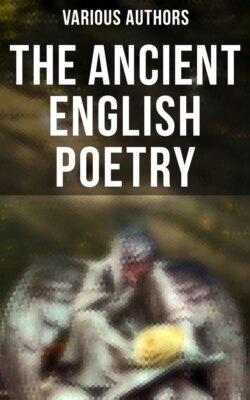Читать книгу The Ancient English Poetry - Various Authors - Страница 31
На сайте Литреса книга снята с продажи.
IV.
SIR CAULINE.
ОглавлениеTable of Contents
This old romantic tale was preserved in the Editor's folio MS. but in so very defective and mutilated a condition (not from any chasm in the MS. but from great omission in the transcript, probably copied from the faulty recitation of some illiterate minstrell), and the whole appeared so far short of the perfection it seemed to deserve, that the Editor was tempted to add several stanzas in the first part, and still more in the second, to connect and compleat the story in the manner which appeared to him most interesting and affecting.
There is something peculiar in the metre of this old ballad: it is not unusual to meet with redundant stanzas of six lines; but the occasional insertion of a double third or fourth line, as ver. 31, &c. is an irregularity I do not remember to have seen elsewhere.
It may be proper to inform the reader before he comes to Pt. ii. v. 110, 111, that the Round Table was not peculiar to the reign of K. Arthur, but was common in all the ages of chivalry. The proclaiming a great turnament (probably with some peculiar solemnities) was called "holding a Round Table." Dugdale tells us, that the great baron Roger de Mortimer "having procured the honour of knighthood to be conferred 'on his three sons' by K. Edw. I. he, at his own costs, caused a tourneament to be held at Kenilworth; where he sumptuously entertained an hundred knights, and as many ladies, for three days; the like whereof was never before in England; and there began the Round Table, (so called by reason that the place wherein they practised those feats was environed with a strong wall made in a round form:) And upon the fourth day, the golden lion, in sign of triumph, being yielded to him; he carried it (with all the company) to Warwick."—It may further be added, that Matthew Paris frequently calls justs and turnaments Hastiludia Mensæ Rotundæ.
As to what will be observed in this ballad of the art of healing being practised by a young princess; it is no more than what is usual in all the old romances, and was conformable to real manners: it being a practice derived from the earliest times among all the Gothic and Celtic nations, for women, even of the highest rank, to exercise the art of surgery. In the Northern Chronicles we always find the young damsels stanching the wounds of their lovers, and the wives those of their husbands.336 And even so late as the time of Q. Elizabeth, it is mentioned among the accomplishments of the ladies of her court, that the "eldest of them are skilful in surgery." See Harrison's Description of England, prefixed to Hollinshed's Chronicle, &c.
[This story of Sir Cauline furnishes one of the most flagrant instances of Percy's manipulation of his authorities. In the following poem all the verses which are due to Percy's invention are placed between brackets, but the whole has been so much altered by him that it has been found necessary to reprint the original from the folio MS. at the end in order that readers may compare the two. Percy put into his version several new incidents and altered the ending, by which means he was able to dilute the 201 lines of the MS. copy into 392 of his own. There was no necessity for this perversion of the original, because the story is there complete, and moreover Percy did not sufficiently indicate the great changes he had made, for although nearly every verse is altered he only noted one trivial difference of reading, viz. aukeward for backward (v. 109).
Motherwell reprinted this ballad in his Minstrelsy, and in his prefatory note he made the following shrewd guess, which we now know to be a correct one:—"We suspect too that the ancient ballad had a less melancholy catastrophe, and that the brave Syr Cauline, after his combat with the 'hend Soldan' derived as much benefit from the leechcraft of fair Cristabelle as he did after winning the Eldridge sword." Professor Child has expressed the same view in his note to the ballad.
Buchan printed a ballad entitled King Malcolm and Sir Colvin, which is more like the original than Percy's version, but Mr. Hales is of opinion that this was one of that collector's fabrications.]
